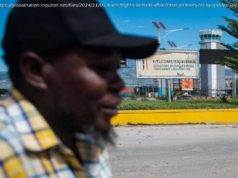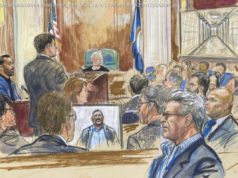After examining 21 American diplomats said to have been victims of a mysterious “attack” in Havana, medical experts found concussion-like damage but no obvious causes.
A group of American diplomats stationed in Havana appear to have symptoms of concussion without ever having received blows to their heads, medical experts have found.
The diplomats originally were said to have been victims of a “sonic attack,” a possibility that the Federal Bureau of Investigation reportedly ruled out in January .
The experts’ report, published late Wednesday in the journal JAMA, does not solve the mystery, instead raising even more questions about what could have caused the brain injuries.
The incidents occurred in 2016, when 18 of the 21 affected diplomats reported they heard strange sounds in their homes or hotel rooms. The noises were loud and sounded like buzzing or grinding metal, or piercing squeals or humming, the diplomats recalled.
Many said they felt increased air pressure, as if they were riding in a car with the windows rolled partway down. Three diplomats said they felt a vibration.
All but one reported immediate symptoms: headache, pain in one ear, loss of hearing. Days or weeks later, other symptoms emerged, including memory problems, an inability to concentrate, mood problems, headaches and fatigue.
The State Department asked researchers at the University of Pennsylvania to investigate. Their report confirmed neurological problems in the diplomats, including signs of what appear to be concussions.
“The study was conducted by the top concussion research team in the world utilizing state-of-the-art methods,” said C. Edward Dixon, a professor of neurological surgery at the University of Pittsburgh, who was not involved in the research. The findings suggest “a significant brain insult,” he said.
Other experts were less convinced, noting inherent weaknesses in such a study despite the expertise of the group conducting it. It would be premature, they said, to conclude there is a mysterious new medical syndrome with an unknown cause.
The study’s lead author, Dr. Douglas H. Smith, director of the Center for Brain Injury and Repair at the University of Pennsylvania, emphasized that there is much more to learn.
“This is a preliminary report,” he said. “We thought it was important to get it out from a public health standpoint.”
But, he added, the patients’ symptoms were notable. “Uniformly, everyone who saw these patients was absolutely convinced,” he said. “It looked like concussion pathology. Processing speed, inability to remember — those are such classic symptoms we see in concussion.”
“We all believe this is a real syndrome,” Dr. Smith added. “This is concussion without blunt head trauma.”
Like concussion patients, some of the diplomats improved on their own, while others recovered only after therapy to regain balance or cognition. “Many went from being miserable to returning to work,” Dr. Smith said.
Dr. Smith and his colleagues do not think audible sound caused the injuries, as sound in an audible range does not damage the brain. Perhaps, they speculated, a device that produced another sort of harmful energy also produced an audible sound. Low-frequency infrasound, high-frequency ultrasound and microwaves have all been shown to damage the brain, the researchers noted.
One drawback to the report is that there was no comparison group, said Karen Postal, immediate past president of the American Academy of Clinical Neuropsychology.
The researchers relied on a battery of cognitive tests that determined cognition had been weakened or impaired if scores were below the 40th percentile. But scores between the 25th and 75th percentiles are considered normal, Dr. Postal noted.
A control group would have shown whether the diplomats who were posted in Cuba did better or worse than other subjects similar to them — ideally others in the State Department who also reported sleep problems, which can interfere with thinking.
“It is common for -injured people to have one or two low scores when given a large set of tests,” Dr. Postal said. “These test results may represent normal variability.”
Dr. Christopher Muth, a neurologist at Rush University Medical Center in Chicago, wrote an accompanying editorial noting that the report should be viewed with caution.
The diplomats were examined an average of 203 days after the purported incidents, and it is not known if they spoke to one another about their symptoms.
“With certain symptoms, you have to take the word of people describing the symptoms,” Dr. Muth said in a telephone interview.
At the same time, the examiners knew the patients had been complaining of neurological symptoms, he noted. Some of the findings depend on the doctor’s subjective interpretation, which could have been biased.
Since many of these symptoms are common in the general population, “you don’t necessarily have to evoke a whole new syndrome to explain them,” Dr. Muth said. “At the same time, no one clear diagnosis immediately comes to mind that can fully explain all of the reported findings.”
Dr. Lee Schwamm, vice chairman of the neurology department at Massachusetts General Hospital, also was unconvinced by the findings.
“I don’t want anyone to think these patients are making this up,” he said. The patients “deserve a tremendous amount of compassion and evaluation.”
But weaknesses in the study — which are no fault of the researchers — give him pause. The fact that more than 200 days passed before the subjects were evaluated raises the risk of “recall bias,” he said: the patient’s memory of the initial exposure becomes less reliable.
“We need to keep open the possibility that in a state of heightened vigilance and anxiety, it is quite natural for individuals to develop the same symptoms,” he added. “Sometimes a suggestion can provoke symptoms.”
Home
United States
USA — Events Diplomats in Cuba Suffered Brain Injuries. Experts Still Don’t Know Why.






